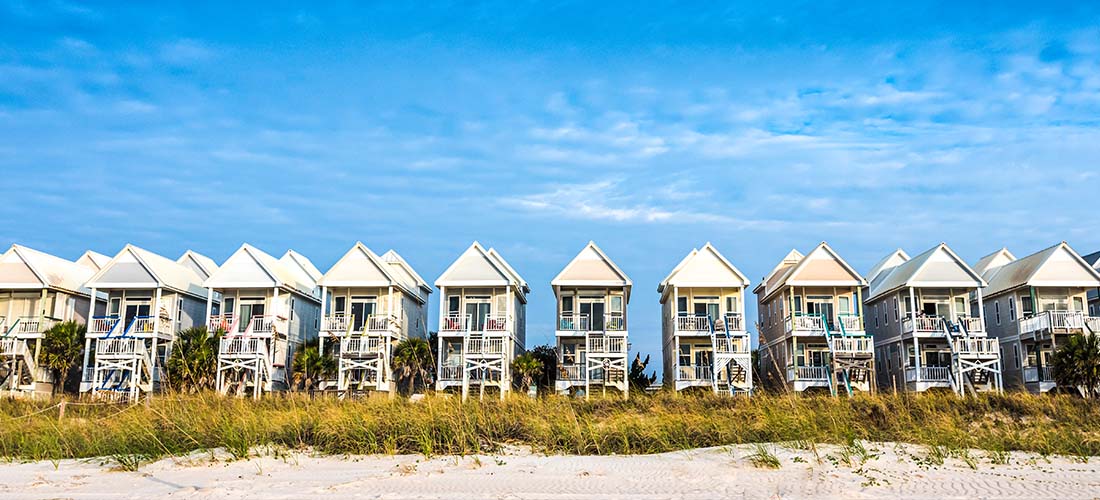
What is a short-term rental?
A short-term rental (STR) is a type of accommodation, such as a private home, room within a home, or one of several other types of properties (condo, apartment, etc.) rented out for a short period—usually no more than 30 days.
Instead of staying at a hotel or other traditional lodging establishment, many individuals, couples, and families opt for STRs as a unique alternative that feels more like a home away from home.
What are the different types of short-term rentals?
The types of short-term rentals can vary, from renting out a spare room in a primary residence to entire homes or apartments. There are also different scenarios when it comes to the property owner’s role. Some common ones include:
- A property owner with more than one home who decides to rent one of the dwellings on a short-term basis.
- A property owner who wants to rent out their accessory dwelling unit (ADU), such as a furnished guest house or garage apartment, on a short-term basis.
- A property owner who decides to rent out a room in their primary home. The level of access a renter has to the rest of the home is up to the property owner.
In most cases, a renter gets to stay in a comfortable, furnished home, while the property owner receives extra income for renting a home or space they are not using.
Are local governments allowed to restrict short-term rentals in their jurisdiction?
Rules around enacting short-term rental restrictions vary by state, but most local governments have a say in how they choose to manage STRs in their jurisdiction.
Some communities might provide guidelines or adopt a formal ordinance that outlines specific requirements, such as property registration or a mandatory inspection. They might also include any zoning requirements and fines a property owner must pay if there is a violation. The specifics of local regulations vary, but they are usually intended to help ensure renters are safe and respectful.
What's the best way for my jurisdiction to manage short-term rentals?
While there’s no one-size-fits-all template, using technology to collect accurate data on the local STR landscape is often a safe place to start. This will help you understand potential impacts and where to focus your short-term rental management efforts over time.
Short-term rentals that are operated with care and consideration have the potential to benefit a community. The people who rent homes, ADUs, or rooms on a short-term basis often spend money at local restaurants, visiting attractions, and shopping at local stores. In this way, participating in the rental industry can help improve the local economy.
That said, planning and continued management are both important and necessary steps when it comes to short-term rentals. Fair and reasonable regulation can help a community avoid issues that have the power to reduce the quality of life of its permanent residents.
Are short-term rental operators required to pay taxes?
The taxing of short-term rentals varies by state and local jurisdiction. Depending on the location, STR operators might be required to collect and remit sales tax, lodging tax, and/or other taxes and fees.
Lodging tax, also called occupancy or transient tax, is paid by the property owner as a part of operating their short-term rental. The property owner typically factors this tax into the price of the STR so the tax can be paid to the appropriate governmental entity (state, local, and sometimes both).
Often, taxing STRs is part of the jurisdiction’s efforts to help level the playing field when it comes to other lodging facilities in the area, such as a hotel or motel, which are already subject to taxes. The tax revenue from short-term rentals can be used in many different ways, including supporting public safety and educational initiatives.
How can local governments balance the benefits and challenges of short-term rentals?
Local governments can balance the benefits and challenges of short-term rentals by:
- Engaging in community outreach and listening to the concerns of residents and stakeholders
- Conducting research and analysis to understand the local short-term rental landscape
- Developing policies that balance the needs of STR operators with other community members to promote responsible and sustainable tourism
- Establishing a process for handling complaints
- Work with stakeholders to promote responsible short-term rental practices
Something as simple as creating standards that address common concerns around noise, parking, occupancy limits, and safety can go a long way.
Local governments can help promote responsible hosting by sharing data and information, providing education and resources, and collaborating on policy development and enforcement. With the right short-term rental management plan, STRs can be a positive addition to your community.
For more information about short-term rentals, visit our short-term rental resource page or contact us today to see how GovOS can help your community create a long-term solution to short-term rentals.










